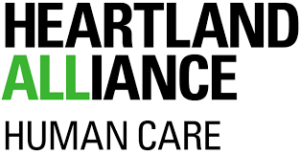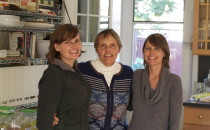This blog is the first in a series of posts by our Social Media Coordinator, Rivka Yeker who sat down with Cassidy Rappaport, Refugee Matching Grant Systems Coordinator – Refugee & Immigrant Community Services (RICS), Heartland Human Care Services, Inc. A Partner of Heartland Alliance.
 Heartland Alliance does the kind of work that intentionally and actively uplifts human lives. We believe in the work they do in finding resources for folks from all over, while we support their mission through collaborating. Hiring crew memebers TK, Hissein, and Dennis to work in the Meez Meals kitchen through Heartland has allowed us to see the impact it has on refugees and their families. We were able to speak to Cassidy Rappaport, the Refugee Matching Grant Systems Coordinator, about Heartland as an organization, inspiration for the work they do, and the logistics of their services. We will be releasing a different post from the interview each week for the next month, as well as introducing the folks working in the kitchen at Meez. Keep your eyes peeled for more insight on an organization that is genuinely working towards helping the lives of millions.
Heartland Alliance does the kind of work that intentionally and actively uplifts human lives. We believe in the work they do in finding resources for folks from all over, while we support their mission through collaborating. Hiring crew memebers TK, Hissein, and Dennis to work in the Meez Meals kitchen through Heartland has allowed us to see the impact it has on refugees and their families. We were able to speak to Cassidy Rappaport, the Refugee Matching Grant Systems Coordinator, about Heartland as an organization, inspiration for the work they do, and the logistics of their services. We will be releasing a different post from the interview each week for the next month, as well as introducing the folks working in the kitchen at Meez. Keep your eyes peeled for more insight on an organization that is genuinely working towards helping the lives of millions.
Heartland provides a myriad of services. How do people seek these services? Does Heartland reach out to people?
Let’s back up and explain the refugee resettlement process. A person flees persecution in their home country and arrives in a secondary country. They then claim refugee status and go through an extensive process to prove this. They are then given refugee status by the United Nations Higher Commission of Refugees. They then live in a camp or temporary living situation, for many years. We have seen cases of folks that were born in refugee camps and arrived to our office with children of their own. Some people are in camps for just a few years, but many are there for much longer. They are then interviewed, go through health screenings and background checks, and wait some more. Very few actually are resettled to a third country, such as the US. They have little to no choice over which country they are resettled to. Unless they have a strong family tie, say in Norway or Germany or elsewhere, they are assigned a random country based on numbers of refugees that country accepts, populations that country works with, and other factors. If they are assigned to the US, it goes to the State Department, who then refers them to one of the 9 head refugee resettlement affiliates in Washington DC, and then those affiliates will assign the case to one of their many offices throughout the United States. We then get a notification of an arrival with minimal information such as family size, country of origin, and a few health details, maybe. We then accept the case and wait some more. We are then given a flight number and told to be at the airport to pick up the family at that time, and we do just that.

Leave a Comment